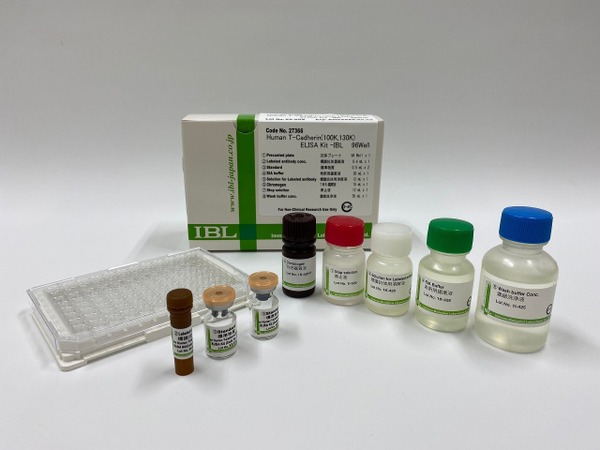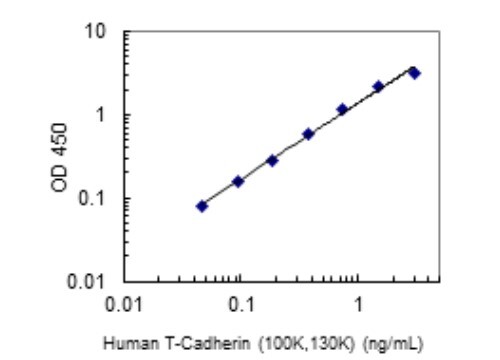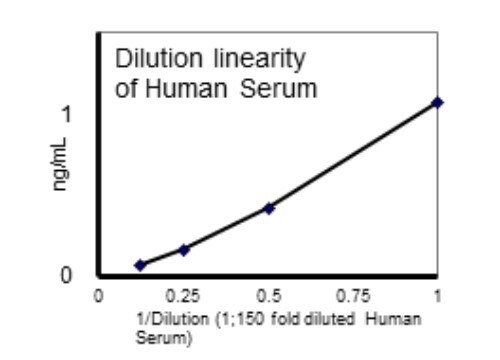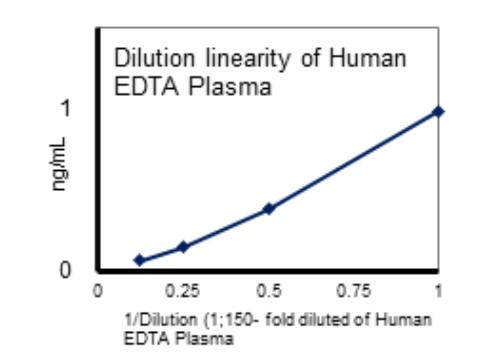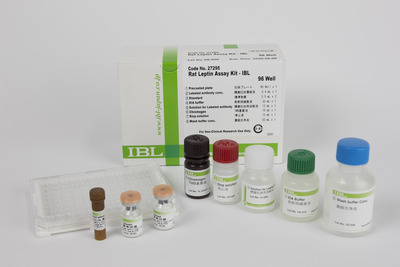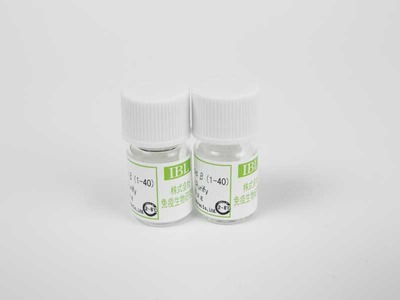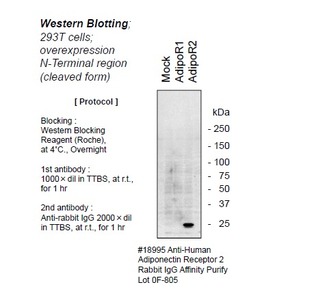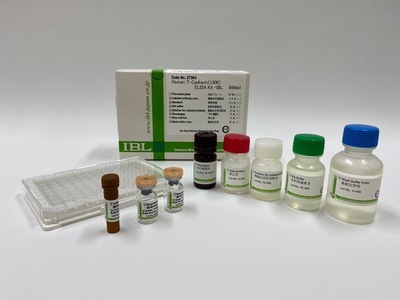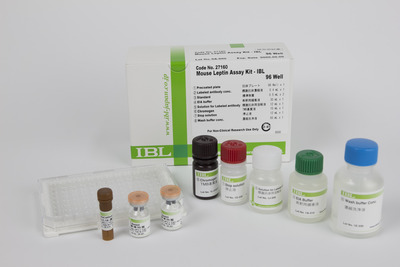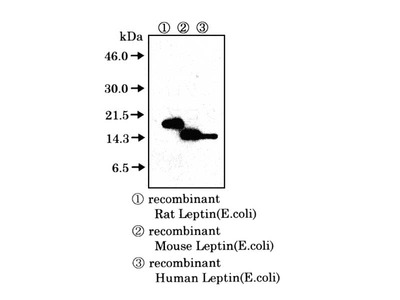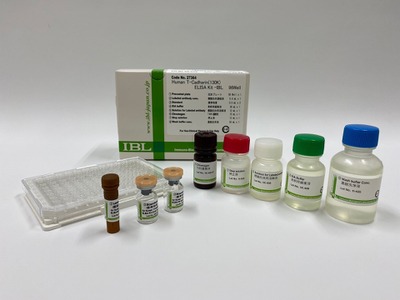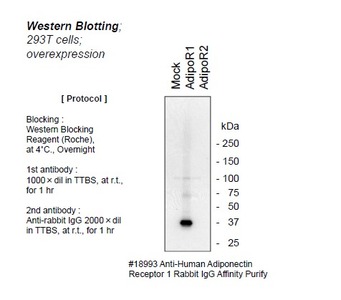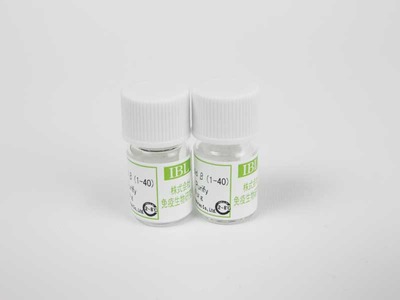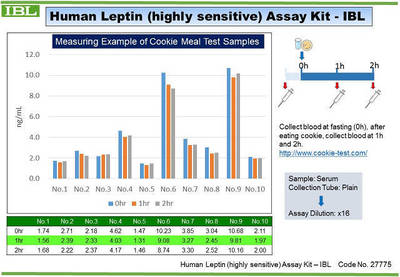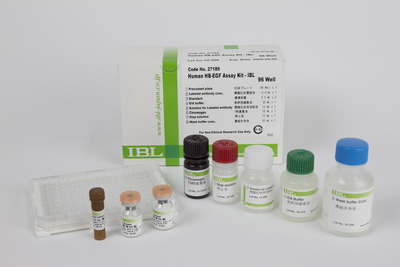- HOME >
- For Researchers >
- Product Search >
- Search Result >
- #27366 Human T-Cadherin(100K,130K) ELISA Kit - IBL
#27366 Human T-Cadherin(100K,130K) ELISA Kit - IBL
- Intended Use:
- Research reagents
- Measuring Method:
- ELISA
- Sample Types:
- Human
- Measuring Samples:
- Serum, EDTA-plasma
- Measurement Range:
- 0.05 - 3 ng/mL
- Package Size1:
- 96 Well
※ The product indicated as "Research reagents" in the column Intended Use cannot be used
for diagnostic nor any medical purpose.
※ The datasheet listed on this page is sample only. Please refer to the datasheet
enclosed in the product purchased before use.
Product Overview
Product Overview
| Product Code | 27366 |
|---|---|
| Product Name | Human T-Cadherin(100K,130K) ELISA Kit - IBL |
| Maker Name | Immuno-Biological Laboratories Co., Ltd. |
| Intended Use | Research reagents |
| Measuring Method | ELISA |
| Conjugate | HRP |
| Species | Human |
| Measuring Samples | Serum, EDTA-plasma |
| Measurement Range | 0.05 - 3 ng/mL |
| Primary Reaction | 90 minutes at 37°C |
| Secondary Reaction | 30 minutes at 2 - 8°C |
| Sensitivity | 0.009 ng/mL |
| Storage Condition | 2 - 8°C |
| Poisonous and Deleterious Substances | Not Applicable |
| Cartagena | Not Applicable |
| Measuring Service | Available |
| Package Size 1 | 96 Well |
Product Description
Product Description
T-Cadherin is a protein that binds to Adiponectin (APN), an adipocyte-secreted factor.
APN binds to and accumulates in aorta, heart, skeletal muscle, and mesenchymal stem cells in systemic tissues via T-Cadherin, and is thought to promote exosome production and exert a protective effect on organ tissues. In addition, SNPs near the T-Cadherin gene are strongly associated with glucose intolerance and cardiovascular disease risk in humans.
Recently, it was reported that soluble T-Cadherin exists in human blood in three forms: 130kDa, 100kDa, and 30kDa. These three soluble forms of T-Cadherin correlate with various clinical parameters in patients with type 2 diabetes, and their concentrations change rapidly in the acute phase of myocardial infarction, so they are expected to be useful as biomarkers.
In addition, soluble T-Cadherin has been found to promote the proliferation of pancreatic beta cells and inhibit the decline in insulin secretory capacity, and its function as a humoral factor is also in focus.
We provide 3 ELISA kits that measure (1) 130kDa molecular species only, (2) 30kDa + 130kDa molecular species, and (3) 100kDa + 130kDa molecular species.
References
References
- Time-Series Change of Serum Soluble T-Cadherin Concentrations and Its Association with Creatine Kinase-MB Levels in ST-Segment Elevation Myocardial Infarction. Iioka M et al. J Atheroscler Thromb. 2022 Dec 1;29(12):1823-1834.PMID: 35228485
- Identification and Clinical Associations of 3 Forms of Circulating T-cadherin in Human Serum. Fukuda S et al. J Clin Endocrinol Metab. 2021 Apr 23;106(5):1333-1344.PMID: 33539522
Note: Retrieve by PMID number in displayed by abstract: http://www.ncbi.nlm.nih.gov
FAQ
FAQ
-
 Q.Does this kit cross react with mouse?
Q.Does this kit cross react with mouse? -
 A.Yes, it does.
A.Yes, it does. -
 Q.Is composition of EIA buffer of each ELISA kit all same? Can it be mixed to use?
Q.Is composition of EIA buffer of each ELISA kit all same? Can it be mixed to use?
ELISA common FAQ -
 A.No it isn't. As constitute of each EIA buffer is different, it cannot be mixed with other lots or EIA buffers contained in other kind of ELISA kits.
A.No it isn't. As constitute of each EIA buffer is different, it cannot be mixed with other lots or EIA buffers contained in other kind of ELISA kits. -
 Q.What is the composition of concentrated wash buffer?
Q.What is the composition of concentrated wash buffer?
ELISA common FAQ -
 A.It contains ordinary Tween and phosphate buffer (0.05% Tween-20 in PB).
A.It contains ordinary Tween and phosphate buffer (0.05% Tween-20 in PB). -
 Q.What is the feature of the plate?
Q.What is the feature of the plate?
ELISA common FAQ -
 A.We use plate that is flat bottom and removable strip type plate (8wellx 12 strips).
A.We use plate that is flat bottom and removable strip type plate (8wellx 12 strips). -
 Q.Can I re-use standard after reconstitution?
Q.Can I re-use standard after reconstitution?
ELISA common FAQ -
 A.Not recommended to re-use standard after reconstitution. Please use it at once after the reconstitution.
A.Not recommended to re-use standard after reconstitution. Please use it at once after the reconstitution.
Please note that there are some exceptions. One time freeze-thaw the standard is acceptable for use after reconstitution for some ELISAs.
Please check the details on each product datasheet. -
 Q.What is different between reagent blank and test sample blank?
Q.What is different between reagent blank and test sample blank?
ELISA common FAQ -
 A.Reagent blank means a well is only added EIA buffer and the purpose is confirming whether the Test sample value is influenced by lack of washing process or other operations. Test sample blank means a well is added EIA buffer and HRP antibody and the purpose is to calculate the background.
A.Reagent blank means a well is only added EIA buffer and the purpose is confirming whether the Test sample value is influenced by lack of washing process or other operations. Test sample blank means a well is added EIA buffer and HRP antibody and the purpose is to calculate the background. -
 Q.How many samples can be measured by this kit?
Q.How many samples can be measured by this kit?
ELISA common FAQ -
 A.The pre-coated plate contained in our ELISA kit is 96 wells plate. We recommend to use 16 wells (2 slits) for standard and 80 wells (10 slits) for 40 samples in duplicate.
A.The pre-coated plate contained in our ELISA kit is 96 wells plate. We recommend to use 16 wells (2 slits) for standard and 80 wells (10 slits) for 40 samples in duplicate. -
 Q.What is LOD (Limit of Detection)?
Q.What is LOD (Limit of Detection)?
ELISA common FAQ -
 A.It (LOD) is defined as sensitivity that is calculated using the NCCSL method. Please refer to a datasheet of each product.
A.It (LOD) is defined as sensitivity that is calculated using the NCCSL method. Please refer to a datasheet of each product. -
 Q.What is LOQ (Limit of Quantification)?
Q.What is LOQ (Limit of Quantification)?
ELISA common FAQ -
 A.It (LOQ) is the lowest value of measurement (standard) range. Please refer to a datasheet of each product.
A.It (LOQ) is the lowest value of measurement (standard) range. Please refer to a datasheet of each product. -
 Q.What is the definition of Over Night (O/N) reaction?
Q.What is the definition of Over Night (O/N) reaction?
ELISA common FAQ -
 A.It means that the reaction is required more than 16 hours unless otherwise specifically defined it on a datasheet of each ELISA product.
A.It means that the reaction is required more than 16 hours unless otherwise specifically defined it on a datasheet of each ELISA product. -
 Q.What is the specification of quality control for ELISA product release?
Q.What is the specification of quality control for ELISA product release?
ELISA common FAQ -
 A.The information of specification is available on individual lot specific CoA. Please contact us with your reference lot number for obtaining of specific CoA.
A.The information of specification is available on individual lot specific CoA. Please contact us with your reference lot number for obtaining of specific CoA. -
 Q.What is the number (e.g. 432143214321) at the edge of strips of the plate?
Q.What is the number (e.g. 432143214321) at the edge of strips of the plate?
ELISA common FAQ -
 A.According to the plate maker (ThermoFisher), it does not have any specific meaning as it is just the number of molds.
A.According to the plate maker (ThermoFisher), it does not have any specific meaning as it is just the number of molds. -
 Q.How to wash an ELISA plate?
Q.How to wash an ELISA plate?
ELISA common FAQ -
 A.Washing it by an auto-washer is highly recommended.
A.Washing it by an auto-washer is highly recommended.
If it is not available, please refer to the demo video (only 2 mins) using a washing bottle. -
 Q.The wells turned black during the test with the kit.
Q.The wells turned black during the test with the kit.
ELISA common FAQ -
 A.It is possible that the wells were not washed sufficiently during the washing process after the HRP-labeled antibody reaction.
A.It is possible that the wells were not washed sufficiently during the washing process after the HRP-labeled antibody reaction.
Be sure to wash the wells enough times as described in the data sheet with washing buffer of more than 350 µL.

